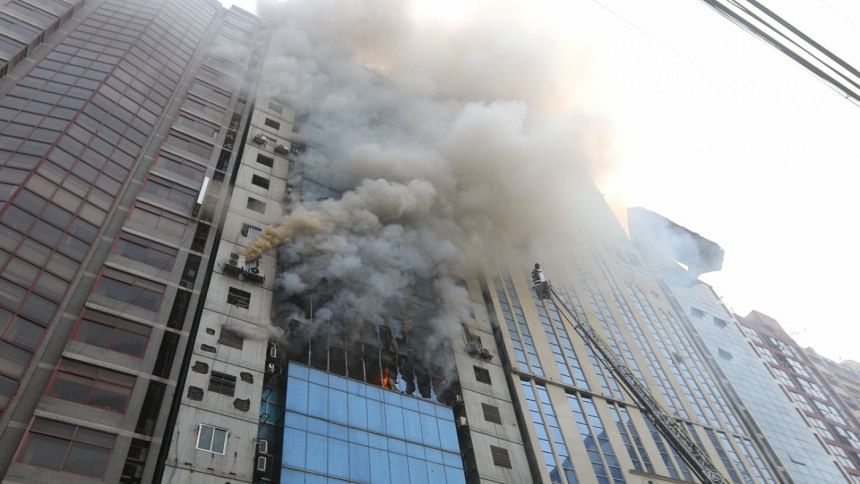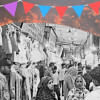The wrong kind of fire

Fire has been essential for human development. Without the domestication of fire, humans couldn't migrate to inhospitable regions of the world. Fire kept them warm and enabled them to roast meat that would otherwise have been full of parasites and germs. Like water and air, fire has been fundamental for human survival.
But fire, the wrong kind, has also threatened humanity across historical eras. The expression that "Nero fiddled while Rome burned" could very well be used to describe many fire-induced disasters in other cities and times. Fire has been used as a form of corporal punishment. Joan of Arc, the medieval French peasant girl, was tried for witchcraft and heresy, and burned at the stake in 1431. As I write this piece, the whole world watched in horror a fire-engulfed Notre Dame cathedral, a Parisian icon that inspired generations of artists, novelists, poets, and Francophiles.
Lately, Bangladesh has been bedevilled by the wrong kind of fires. Devastating fires killed scores of people in Old Dhaka, at Faruk Rupayan Tower in Banani, and other places in the country. Criminal negligence of fire prevention measures and inadequacy of fire response plans reveal how unprepared we remain for our middle-income aspirations. Most heartbreakingly, a young female madrasa student was recently set ablaze by the cohorts of a sexual predator because she sought to bring the culprit to justice. The frequent occurrence of the wrong kind of fires shows how unstable the country's collective moral backbone has become.
The time has come to discuss fire disasters in all their cultural, social, political, environmental, and urban contexts. Nusrat Jahan Rafi, a student in Sonagazi Islamia Senior Fazil Madrasa in Feni, a southeastern town in Bangladesh, lodged a complaint against the madrasa principal who molested her. The deviant principal's burqa-clad accomplices took her to the rooftop of her school building, poured kerosene on her and set her on fire. They wanted her to die a violent, burning death.
But it was much more than that. It was an act of terrorism that was designed to set a brutal example of intimidation. That is, they rule and nobody should rise against them. Sexual predators, masquerading as teachers, operate with total impunity because they know how to position themselves in the fortified shelter of political affiliation, financial arrangement, and religious devotion.
Many would cite Nusrat's murder as a case of gender violence, allowed within the asymmetric and male-centric power structures of Bangladesh. But it is much more complex than how we conventionally understand gender violence as a conflict of male/female binary. Look at the processions that came out in Feni in support of the accused principal. Women are in the front row, demanding his immediate release. It is alleged that a few members of the group that set Nusrat afire were female students, who attended the madrasa with her. Nusrat's murder was preplanned, with a host of actors, and should not be seen merely as a case of patriarchy oppressing powerless women.
Her brutal death should alert us that gender violence, patriarchal domination, religious manipulation, financial nexus, and local politics create a variety of social chemical reactions that poison society in ways that black-and-white arguments often weaken or sever the path to justice. It is important to understand, for example, how gender violence is simultaneously enabled and overlooked within the local tapestry of religious sentiments, political connections, and financial movements.
Seeing some of Nusrat's fellow female classmates demanding the release of the accused principal of the madrasa despite his direct complicity in the heart-wrenching death of the girl who sat with them on the same bench, read the same books, and possibly walked home together, should warn us about the ways in which religious patriarchy controls young minds with twisted interpretations of religion that suit their evil design. Would these girls still demand his release knowing that he allegedly orchestrated her murder from the district jail? In their minds, these girls possibly think that they are defending their principal who represents Islam. Is there anybody who could convince them that he absolutely doesn't? Would the judicial court challenge the taboo subject of religious superstition and prejudice? What would it take to change the culture of ignorance and auto-manipulation?
By no means is this type of culture unique to Bangladesh. The rise of right-wing populism in the US, Brazil, Hungary, India, and other countries shows how a large number of people can be easily brainwashed to follow a false messiah. We are indeed passing through a troubling time. New Zealand Prime Minister Jacinda Ardern's stewardship, in the wake of the Christchurch mosque massacre, inspired hope that a leader's moral authority could transcend the petty politics of invested quarters.
It is time to fight for a better and humane Bangladesh. The increasing number of the wrong kind of fires suggests that Bangladesh needs to recalibrate its priorities to make "middle-income" aspirations more meaningful, beyond economic measures. I am sure Prime Minister Sheikh Hasina was enraged by the tragic news of Nusrat's violent death. Like any other leader and mother, she would like to see the terrorists—who silenced Nusrat for good—brought to justice. This is both normal and hopeful.
But we need a cultural sea change to combat the kind of wrong fires that have been plaguing Bangladesh lately. The spectacular inadequacy of the fire brigade, in the wake of the Faruk Rupayan Tower inferno, shows that we are not yet ready to face the challenges of a modern, industrialising society. It is expected that as we modernise, urbanise, and build taller buildings, we'll have more and more chances of fire in our buildings. People will continue to die if we don't abide by building safety codes and enforce them.
The culprits who burned Nusrat to death and the building owners who ignored fire safety measures in their property in order to lower building construction and operational costs are motivated by one deep-seated pathology: they can get away with murder because they believe they have the political, financial, or religious backing of their superiors. No society can genuinely prosper without a fundamental arrangement of the rule of law and an ingrained sense of the greater good.
Adnan Zillur Morshed is an architect, architectural historian, urbanist, and columnist. He teaches in Washington, DC, and serves as the executive director of the Centre for Inclusive Architecture and Urbanism at BRAC University. He can be reached at [email protected].









Comments